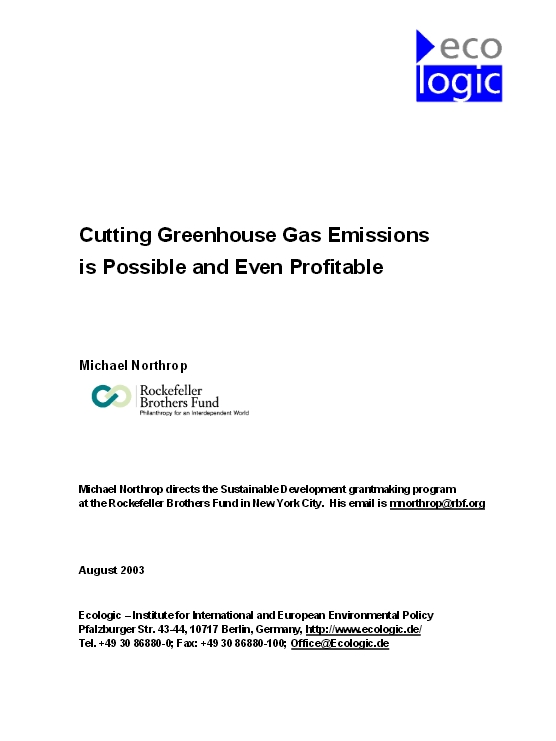Cutting Greenhouse Gas Emissions is Possible and Even Profitable
- Publication
- Citation
Northrop, Michael 2014: Cutting Greenhouse Gas Emissions is Possible and Even Profitable. Ecologic Institute, Berlin, commissioned.
Businesses, cities, states, universities and churches are striving to reduce greenhouse gas emissions to protect the Earth's climate. A new transatlantic survey by Michael Northrop reveals a multitude of initiatives, both in the U.S. and in Europe. Michael Northrop directs the Sustainable Development grantmaking program at the Rockefeller Brothers Fund (RBF) in New York City and is the author of this paper.
The survey builds on the "Conference of the Reducers" in May 2003, where leading corporate and government greenhouse gas reducers from the United States, Canada, Europe, and Australia offered upbeat accounts of their efforts to address climate change. Presentations from a wide range of corporate and government participants suggest that not only is it possible to reduce green-house gas (GHG) emissions, but that it is also cost effective – even profitable – to do so.
The paper starts with an overview of activities successfully implemented by business before turning to governmental actors setting the policy and regulatory framework. It presents examples of action by national governments (or federal governments, such as in Germany), and focuses on initiatives by local authorities and city governments. Outside the United States, the approaches taken by state governments in the US are currently observed with heightened interest, and the current situation is summarized. On this basis, a number of observations are made:
- It is practical to reduce greenhouse gas emissions in a wide array of contexts using a variety of strategies.
- Emissions reductions programs are cost effective and often profitable; the long-term benefits are also seen as substantial in many instances.
- These success stories need to be widely shared.
- Emissions reductions are faster and deeper when policy measures are linked to financing.
In conclusion, it appears that the world is turning a corner on climate change. Though international discussions about a multilateral climate treaty remain incomplete, a critical mass of greenhouse gas reducers has moved forward in a variety of different governmental, corporate, and civic settings. Their actions are demonstrating that steep GHG reductions can be achieved in practical and cost-effective ways. Given this wealth of emerging experience, this information must be shared more broadly. Doing so could accelerate emissions reductions worldwide.
Here you can download the paper [pdf, 34 KB, English].
Michael Northrop directs the Sustainable Development grantmaking program at the Rockefeller Brothers Fund (RBF) in New York City.
The "Conference of the Reducers" was organized by the RBF together with the German Marshall Fund of the United States (GMF).



